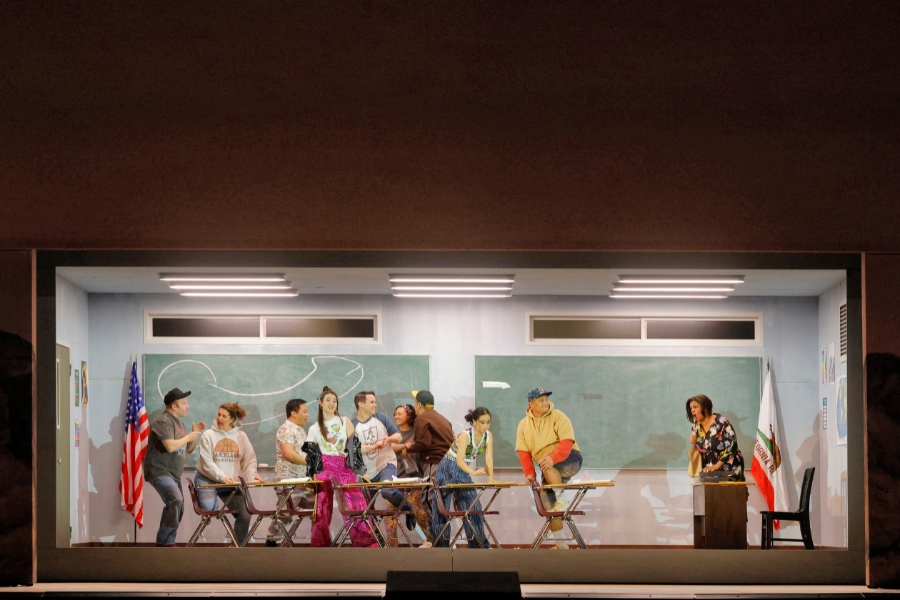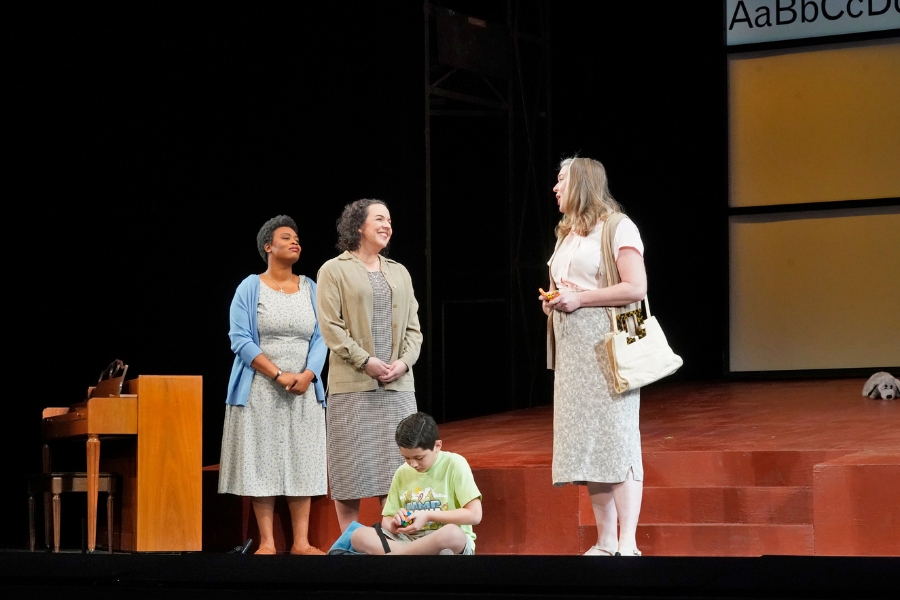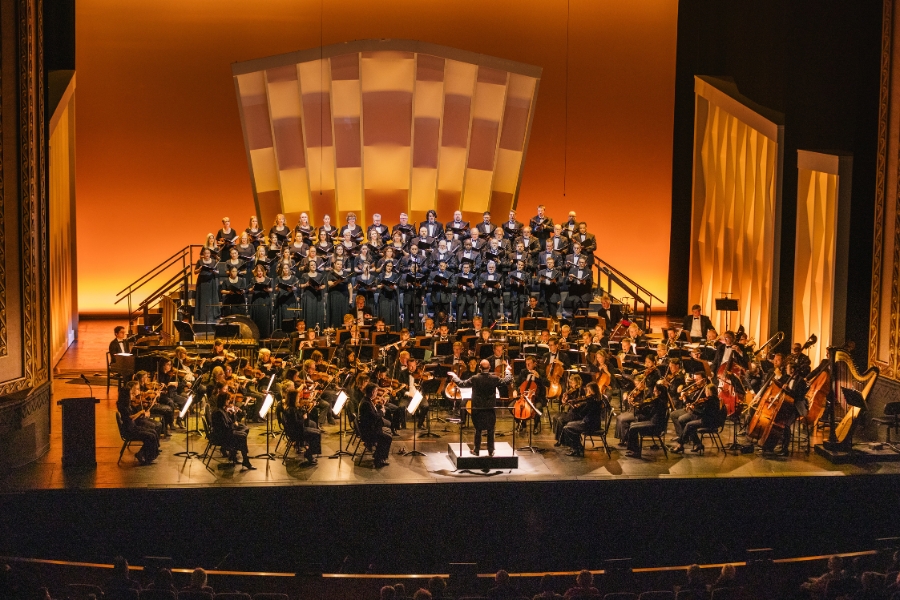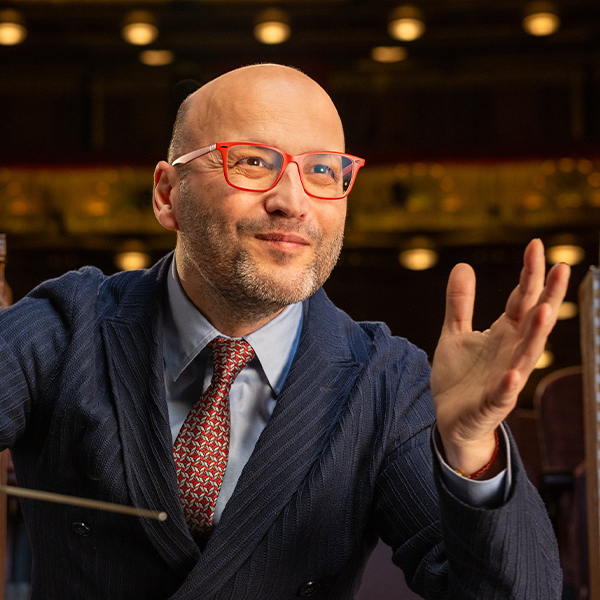November 04, 2025
In perfect harmony: the experience of joining the Lyric Opera Chorus
Whether they appear as hopeful prisoners longing for freedom and sunlight in Fidelio or vibrant Parisians celebrating Christmas Eve in La Bohème, the chorus plays a powerful and integral role in opera. The Lyric Opera Chorus is one of the most distinguished ensembles of its kind in the world, renowned for the beauty of their sound, the thoroughness of their musicianship, their stylistic versatility, and their theatrical flair.
Even in the operas that pose particularly formidable choral demands, such as Orphée et Eurydice, Les Troyens, Eugene Onegin, The Pearl Fishers, Faust, and Idomeneo, Lyric’s group consistently earns the highest praise. This season brings one of the group’s most prominent and challenging roles in recent memory, with the Lyric debut of Orff’s Carmina Burana. One of the most famous and frequently performed choral works of the 20th century, the secular cantata will bring 100 members of the Lyric Opera Chorus together to breathe life into the large scale and dramatic nature of Orff's epic choral masterpiece.
Operagoers might wonder: How does one become a member of this elite ensemble of classically-trained professionals who can act, dance, and sing in multiple languages? While every chorister is fueled by a passion for opera and a commitment to their craft, each artist follows their own path to the stage.

Geoffrey Agpalo at the head of the class in Lyric's 2024/25 production of The Listeners.
For tenor and Chicago native Geoffrey Agpalo, the journey to Lyric began as a way to find connection. “My family moved across the United States when I was a teenager and performing became my outlet for making friends and building a sense of community,” he says. “I discovered my gift for opera in college.” The discovery of this gift and a desire to perform professionally brought him back to Chicago for graduate school, a move which ultimately led him to his hometown opera.
Soprano Desirée Hassler took a different path to the stage than many in the opera world, focusing on academia. She joined the Lyric Opera Chorus in 2009, a role she passionately took on while balancing her academic pursuits, traveling to the city to sing at Lyric while also completing her doctorate in Vocal Performance and Literature at the University of Illinois. “The commute home was long, but the adrenaline I got from singing at Lyric with such inspiring company kept me awake,” she shares.
Regardless of where their musical journey starts, all singers must go through a highly competitive audition process. Lyric’s annual chorus auditions welcome skilled singers ready to perform at the professional level. Preliminary auditions are usually held in Chicago and take place over the course of a week, for 15 to 20 hours total.
Auditioning singers prepare two contrasting arias in different languages, both memorized. Auditions are brief, so singers are encouraged to select pieces that best showcase their range and vocal strengths. Sight-reading may also be requested, as strong musicianship and the ability to learn music quickly are essential for success in the Lyric Opera Chorus. Following preliminary auditions, the selection panel including Lyric’s Chorus Director and Head of Music, Michael Black, and Vice President, Artistic Operations and Administration, Stephanie Karr, decide which singers will be invited to callbacks.

Desirée Hassler as Sister Catherine in Lyric's 2019/20 production of Dead Man Walking.
Selected singers become a member of the Lyric Opera Chorus, made up of three levels:
Regular Chorus members are contracted for Lyric’s full season and are considered full-time, seasonal employees. With 40 members, this is a rare position to hold — not just at Lyric, but nationwide — as there are very few full-time, tenured opera choristers in the country.
Core Supplementary Chorus is an integral extension of Lyric’s Regular ensemble. These 12 accomplished singers perform in at least one production each season and are called upon when additional vocal forces are needed.
Supplementary Chorus members join Lyric’s ensemble for productions that require even more expanded vocal forces or specialized repertoire. Their versatility and skill enhance some of the company’s most ambitious works, including large-scale pieces such as Carmina Burana.

Lyric's 2017/18 production of Puccini's Turandot.
Hassler started her career at Lyric in 2009, initially hired as a member of the Supplementary Chorus before auditioning again to earn a coveted spot in the Regular Chorus in 2014. “I’ve been loving it ever since.” Over her years at Lyric, Hassler has sung and covered roles in several productions including Tannhäuser, Macbeth, Elektra and Der Rosenkavalier.
Similarly, Agpalo began as a member of the Supplementary Chorus in 2010 before joining the Regular Chorus in 2014. He has performed solos in La Bohème, The Listeners, Turandot, and Champion, as well as serving as a cover in several productions through the years.
As members of one of the most distinguished ensembles of its kind in the world, Lyric choristers perform in a wide mix of classic operas, contemporary pieces, and concerts each season. From traditional pieces to bold new premieres, each day brings something new, even after 15 seasons in the ensemble.
“In the chorus, we have to specialize vocally in… everything,” says Hassler. “One season, I remember singing in a five hour Wagner matinee performance, and after an hour turnaround, we had a three hour rehearsal for a Handel opera.” While incredibly demanding, Agpalo and Hassler agree the role of a professional chorister is a career like no other.

The Lyric Opera Chorus and Orchestra takes center stage in A Wondrous Sound (2024/25).
“Being a member of the Lyric Opera Chorus is a unique experience. It’s something that’s hard to find in the world of classical voice. The demands of opera require us not only to sing at the highest musical level, but also to play,” says Agpalo. “We act, move, and fully embody the characters and stories we help bring to life. That level of physical and emotional engagement makes the work incredibly dynamic and fulfilling.”
This unique position also allows them flexibility to follow other professional passions — even those that take them away from Lyric.
“One of the great things about being part of this ensemble is that you're not only given the opportunities to pursue solo work, but are also encouraged and supported by a wonderful group of colleagues and leaders who genuinely celebrate your successes,” says Agpalo, who previously took a leave of absence from the chorus to focus on solo work, performing with opera companies across the country.
This support also extends to work outside the realm of performance, as Hassler has continued to balance academics with performing, teaching voice and music history courses along with her role as a full-time chorus member. “I’ve always held teaching and performing as two equal sides of who I am professionally,” she says. “I was told there would come a time when I’d have to pick one or the other in order to reach the highest level, but so far that day hasn’t come,” she continues. “Every day I work at Lyric is a master class.
There are times I sit next to a colleague in rehearsal and I’m blown away by their talent.”
Through long hours spent together working on everything from spirituals and musical theater selections for their Great Choral Works community tour to Latin, Middle High German, and Old French choral works for Carmina Burana, the Lyric Opera Chorus has developed a strong, supportive community over the years that brings something special to their work onstage.
“It’s the rare combination of artistic excellence, theatrical collaboration, and genuine connection that makes being part of this chorus so meaningful to me,” says Agpalo.

